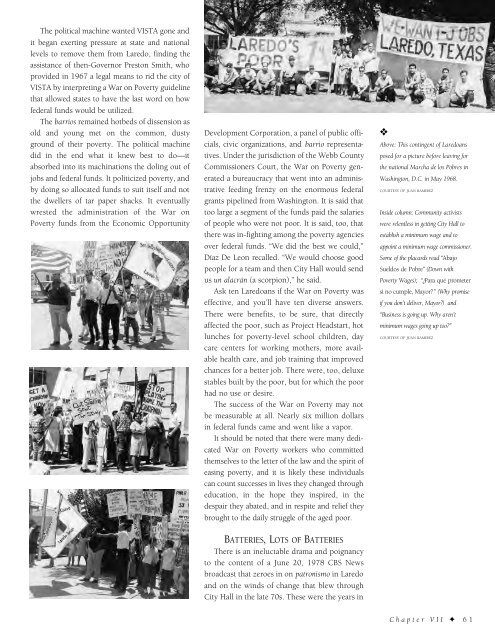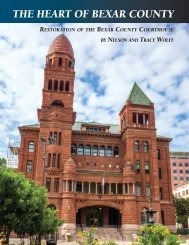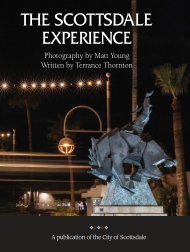Historic Laredo
An illustrated history of the city of Laredo and the Webb County area, paired with the histories of companies, families and organizations that make the region great.
An illustrated history of the city of Laredo and the Webb County area, paired with the histories of companies, families and organizations that make the region great.
You also want an ePaper? Increase the reach of your titles
YUMPU automatically turns print PDFs into web optimized ePapers that Google loves.
The political machine wanted VISTA gone and<br />
it began exerting pressure at state and national<br />
levels to remove them from <strong>Laredo</strong>, finding the<br />
assistance of then-Governor Preston Smith, who<br />
provided in 1967 a legal means to rid the city of<br />
VISTA by interpreting a War on Poverty guideline<br />
that allowed states to have the last word on how<br />
federal funds would be utilized.<br />
The barrios remained hotbeds of dissension as<br />
old and young met on the common, dusty<br />
ground of their poverty. The political machine<br />
did in the end what it knew best to do—it<br />
absorbed into its machinations the doling out of<br />
jobs and federal funds. It politicized poverty, and<br />
by doing so allocated funds to suit itself and not<br />
the dwellers of tar paper shacks. It eventually<br />
wrested the administration of the War on<br />
Poverty funds from the Economic Opportunity<br />
Development Corporation, a panel of public officials,<br />
civic organizations, and barrio representatives.<br />
Under the jurisdiction of the Webb County<br />
Commissioners Court, the War on Poverty generated<br />
a bureaucracy that went into an administrative<br />
feeding frenzy on the enormous federal<br />
grants pipelined from Washington. It is said that<br />
too large a segment of the funds paid the salaries<br />
of people who were not poor. It is said, too, that<br />
there was in-fighting among the poverty agencies<br />
over federal funds. “We did the best we could,”<br />
Díaz De Leon recalled. “We would choose good<br />
people for a team and then City Hall would send<br />
us un alacrán (a scorpion),” he said.<br />
Ask ten <strong>Laredo</strong>ans if the War on Poverty was<br />
effective, and you’ll have ten diverse answers.<br />
There were benefits, to be sure, that directly<br />
affected the poor, such as Project Headstart, hot<br />
lunches for poverty-level school children, day<br />
care centers for working mothers, more available<br />
health care, and job training that improved<br />
chances for a better job. There were, too, deluxe<br />
stables built by the poor, but for which the poor<br />
had no use or desire.<br />
The success of the War on Poverty may not<br />
be measurable at all. Nearly six million dollars<br />
in federal funds came and went like a vapor.<br />
It should be noted that there were many dedicated<br />
War on Poverty workers who committed<br />
themselves to the letter of the law and the spirit of<br />
easing poverty, and it is likely these individuals<br />
can count successes in lives they changed through<br />
education, in the hope they inspired, in the<br />
despair they abated, and in respite and relief they<br />
brought to the daily struggle of the aged poor.<br />
❖<br />
Above: This contingent of <strong>Laredo</strong>ans<br />
posed for a picture before leaving for<br />
the national Marcha de los Pobres in<br />
Washington, D.C. in May 1968.<br />
COURTESY OF JUAN RAMIREZ<br />
Inside column: Community activists<br />
were relentless in getting City Hall to<br />
establish a minimum wage and to<br />
appoint a minimum wage commissioner.<br />
Some of the placards read “Abajo<br />
Sueldos de Pobre” (Down with<br />
Poverty Wages); “¿Para qué prometer<br />
si no cumple, Mayor?” (Why promise<br />
if you don’t deliver, Mayor?) and<br />
“Business is going up. Why aren’t<br />
minimum wages going up too?”<br />
COURTESY OF JUAN RAMIREZ<br />
BATTERIES, LOTS OF BATTERIES<br />
There is an ineluctable drama and poignancy<br />
to the content of a June 20, 1978 CBS News<br />
broadcast that zeroes in on patronismo in <strong>Laredo</strong><br />
and on the winds of change that blew through<br />
City Hall in the late 70s. These were the years in<br />
Chapter VII ✦ 61
















